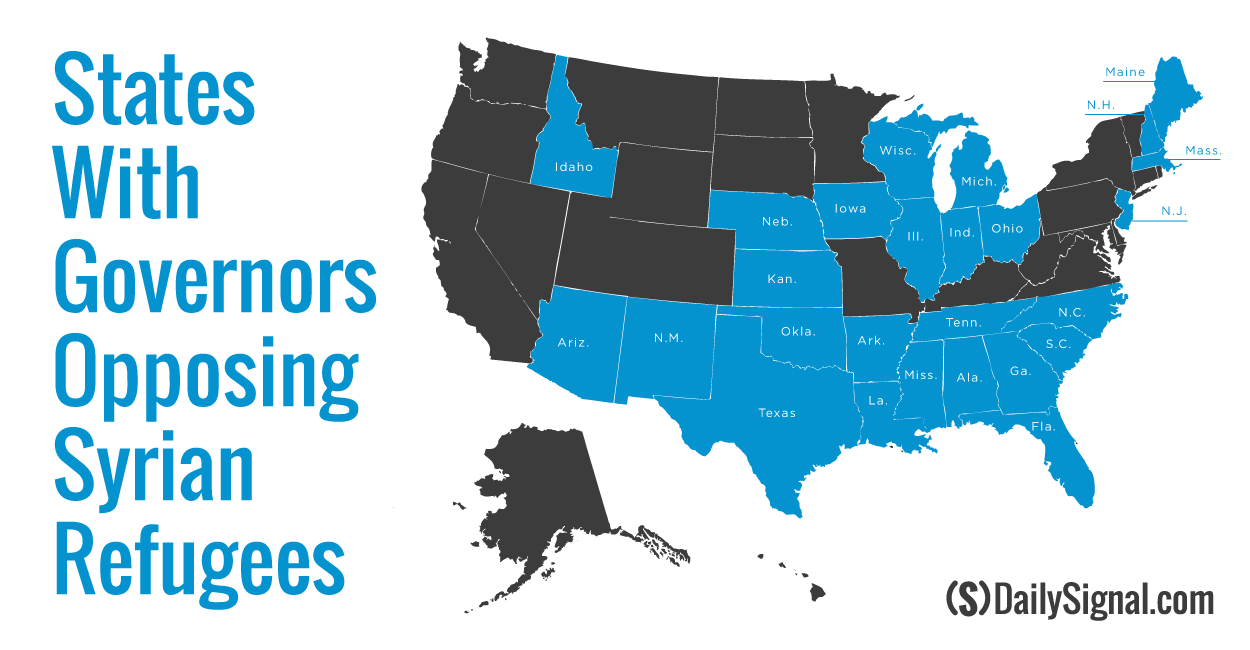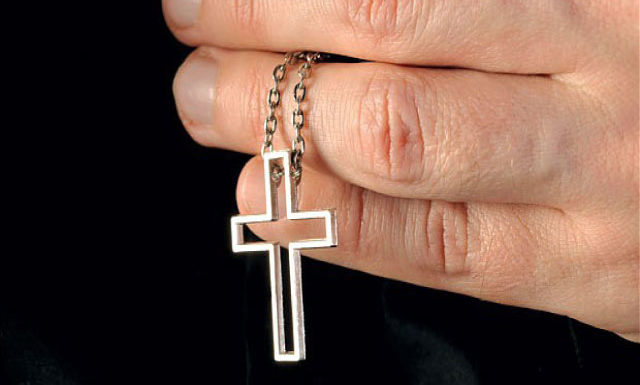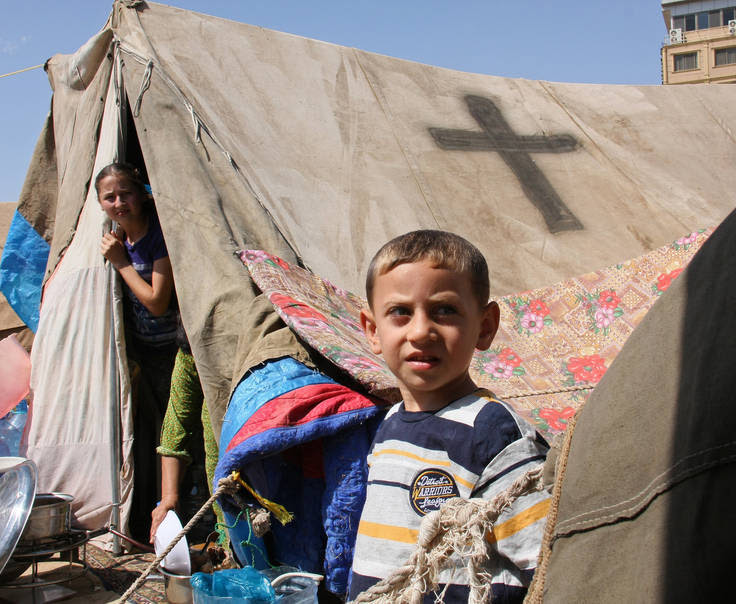Sen. Tom Cotton: U.S. Discriminates against Christian Refugees
Arkansas U.S. Senator Tom Cotton “broke news” today that the U.S. “inadvertently” discriminates against Christians among Syrian Refugee Admissions.

At least that is the impression lent by the Washington Times, report this morning, “U.S. ‘discriminates’ against Christian refugees, accepts 96% Muslims, 3% Christians:”
Less than 3 percent of the Syrian refugees admitted to the United States so far are Christian and 96 percent are Muslim, the result of a referral system that Republican Sen. Tom Cotton says “unintentionally discriminates” against Christians.
State Department figures released Monday showed that the current system overwhelmingly favors Muslim refugees. Of the 2,184 Syrian refugees admitted to the United States so far, only 53 are Christians while 2,098 are Muslim, the Christian News Service reported.
Mr. Cotton and Sen. John Boozman, both Arkansas Republicans, called Monday for a moratorium on resettlements, a White House report on vetting procedures, and a re-evaluation of the refugee-referral process.
“[T]he United States’ reliance on the United Nations for referrals of Syrian refugees should also be re-evaluated,” said Mr. Cotton in a statement. “That reliance unintentionally discriminates against Syrian Christians and other religious minorities who are reluctant to register as refugees with the United Nations for fear of political and sectarian retribution.”
The current system relies on referrals from the United Nations High Commissioner for Refugees. Syria’s population in 2011 was 90 percent Muslim and 10 percent Christian, CNS said.
Mr. Cotton and Mr. Boozman called Monday for a temporary moratorium on resettlements and “a requirement that the President certify the integrity of the security vetting process as a condition of lifting the moratorium.”
“The American people have long demonstrated unmatched compassion for the world’s persecuted and endangered. But when bringing refugees to our shores, the U.S. government must put the security of Arkansans and all Americans first,” Mr. Cotton said. “No terrorist should be able to take advantage of the refugee process to threaten the United States.”
This confirms what Mike Bates and I reported in our June 2015 New English Review with Ann Corcoran. See: Trojan Horse Federal Refugee Program. Note this exchange:
Gordon: Ann, one of the most disturbing parts of this U.N. controlled program is the patent discrimination against endangered Christian refugees, legitimately, from places like Syria, Iraq and other locations. What is the evidence of that?
Corcoran: Let’s just take the Syrian refugee issue. So far the State Department has brought in a small number of Syrians, relatively speaking, into the country. One would think that we would be choosing first and foremost the Christians who are in real danger. But we are bringing mostly Sunni Muslims. There were about 800 Syrians who have been brought into the country in the last few years. Now the State Department and the U.N. have 11,000 in the pipeline waiting to come into the U.S.
But of the 800 that have come in so far, approximately 700 are Sunni Muslims, there were only 43 Christians among the Syrian refugees that have come in so far. That translates to approximately 92 percent of refugees coming in from Syria are Muslims.
I’m told that that is mostly because we are bringing them in from U.N. camps, where the Muslims are found. Christians do not go to the U.N. camps, but to Turkey if they get out of Syria at all, where they’re taken care of by the Syriac church.
That pattern of Christians avoiding UN refugee camps was also cited in our interview with Joseph Kassab of the Iraqi Christian Advocacy and Empowerment Institute in the November NER, Iraqi Christians Face Extinction:
Gordon: What are the current conditions of Iraqi Christian refugee camps in the Kurdish Region and what kinds of assistance are they receiving?
Kassab: The current conditions for Iraqi Christian IDPs are very chaotic and horrific. The Kurdish Regional Government (KRG) is doing its best to provide for them. However, they are unable to absorb more than 3 million refugees from Syria and Yazidis in their region. The Iraqi government has done nothing for its citizen IDPs. Corruption is very high among the Iraqi government officials and that by itself makes distribution of relief to its IDPs very poor. The UN and humanitarian local and international NGOs are unable to function properly due to lack of coordination and efficient capacity. Therefore people are losing hope and are availing of any opportunity to escape abroad. Christians are urban refugees-IDPs meaning that they do not live in UN refugee camps. Instead they seek shelter with relatives, in unfinished buildings, parks and churches. Overall, this support can be very short lived because volunteering always has a sunset.
Nina Shea of the Washington, DC-based Hudson Institute Center for Religious Freedom in a separate Fox News.com report added:
The UN is basically unloading; it’s emptying out its camps. It’s not seeking those who are outside its camps, much less giving affirmative action for those who are facing genocide. It’s just an expedience measure for those who are in their own camps, so non-Muslim minorities are poorly represented among them.
What is confounding was the petulant response of President Obama at his Antalya G20 Summit press conference on this matter. His remarks were allegedly directed at US Texas Senator Ted Cruz for having the effrontery to suggest that Syrian Christians and other threatened non-Muslim minorities be granted some preference for Refugee Admissions and Muslims sent to Muslim majority countries. The Washington Timesreported that, “at his G20 news conference Monday in Turkey, President Obama described as ‘shameful’ the idea of giving religious preferences to refugees.”That’s not American. That’s not who we are. We don’t have religious tests to our compassion,’ Mr. Obama said.”
We would suggest that the President bone up on how the UN controls who gets admitted as humanitarian refugees in America. That American taxpayers are funding this plenary program run by executive fiat under the Refugee Act of 1980 co-authored by Vice President Biden and the late Sen. Edward Kennedy. It is time for Congress urged on by more than 27 Governors concerned about admission of possible terrorist refugees to do something. That is why US House Speaker Pat Ryan proposed a “pause” in the Syrian Refugee Program. If you listen to Deputy National Security Adviser, Ben Rhodes, Anne Richards, assistant Secretary for the Bureau of Population, Refugees and Migration, they would have you believe that the 10,000 Syrian Refugees bring brought here in the current fiscal year were all vetted.
This morning I listened to a news conference convened by Voluntary Agencies and NGOs to combat the concerns of the more than two dozen governors. They represented that the UNHCR has an advanced retina scanning biometric system capable of capturing information to track the millions of displaced Syrian refugees in their camps. That DHS is capable of checking the records of these Syrian refugees despite evidence that documents may either not exist or are forged. Further, that if the Governors of states do not participate in resettlement programs that these very same Voluntary agencies stand ready to make more money to distribute them. Moreover, that if states deny those benefits to refugee clients, the clients with their green cards can simply pick up like any other US citizen and move to another state. To top things off, they represented that no terrorists have been admitted as refugees. They obviously forgot about the refugee Tsarneav brothers who perpetrated the bloody Boston Marathon bombing. Or the two Iraqi asylees, caught in a 2011 FBI sting in Kentucky purchasing weapons to be sent to Al Qaeda. Then think of the dozens of Soimali emigre youths recruited by radical Imams to fight and die for Al Shabaab in Somalia. Consider the Somali emigre aircraft cleaner who had the run of the Twin Cities airport who left to fight and die for ISIS in Syria. Listen to this Syrian Refugee Admissions press conference.
Yesterday, we reported that Florida Governor Rick Scott sent a letter to US House Speaker Paul Ryan and Senator Majority Leader Mitch McConnell suggesting that for all intent and purposes state governors have no legal standing to contest the Refugee Admissions Program, but that Congress does. He wrote:
It is our understanding that the state does not have the authority to prevent the federal government from funding the relocation of these Syrian refugees to Florida even without state support. Therefore, we are asking the United States Congress to take immediate and aggressive action to prevent President Obama and his administration from using any federal tax dollars to fund the relocation of up to 425 Syrian refugees (the total possible number of refugees pending for state relocation support at this time) to Florida, or anywhere in the United States, without an extensive evaluation of the risk these individuals may pose to our national security.
As the federal elected body that exercises oversight and authorizes federal spending, please take any action available through the powers of the United States Congress to prevent federal allocations toward the relocation of Syrian refugees without extensive examination into how this would affect our homeland security.
Note what my Florida State House Representative, Mike Hill, a graduate of the US Air Force Academy and veteran said in a Pensacola News Journal article on the Governor’s action:
If they come from a country that fosters, supports or defends terrorism as a legitimate activity to achieve a goal, then it doesn’t matter if there is a small number or large number of refugees coming from those nations. We must refuse them entry without a robust vetting process, which we currently do not have.
The first test of that may come on Thursday at a House Immigration Sub Committee Hearing Chaired by Rep. Trey Gowdy. The lineup of witnesses includes:
‘Ms. Anne C. Richard (Invited)
Assistant Secretary
Bureau of Population, Refugees, and Migration, United States Department of StateMs. Barbara L. Strack (Invited)
Chief, Refugee Affairs Division, Refugee, Asylum, and International Operations Directorate
United States Citizenship and Immigration ServicesMr. Seth Jones
Director
International Security and Defense Policy Center, RAND CorporationMr. Mark Krikorian
Executive Director
Center for Immigration StudiesMr. Mark Hetfield
President and Chief Executive Officer
HIAS (Hebrew Immigrant Aid Society, one of nine federal resettlement contractors)
Let’s see if the US Refugee Admissions Program executives at the State Department and DHS/ICE show up for this House Immigration Committee hearing. Stay tuned for developments.
EDITORS NOTE: This column originally appeared in the New English Review.



 The NER November edition interview with U.S. Iraqi Christian leader Joseph T. Kassab,
The NER November edition interview with U.S. Iraqi Christian leader Joseph T. Kassab, 
 The American response of first
The American response of first 